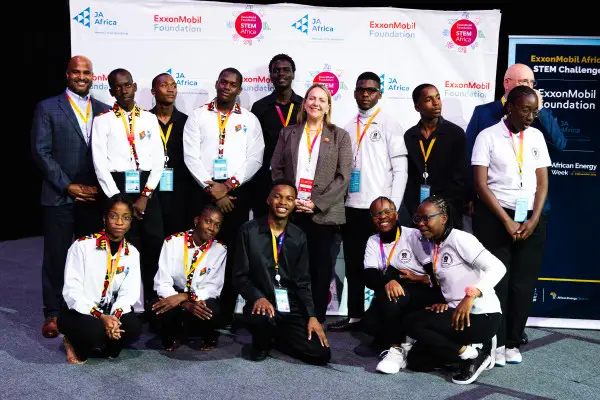Scholars from Mozambique, Nigeria, Namibia and Angola gathered at African Energy Week (AEW): Invest in African Energies 2024 (https://AECWeek.com/) in Cape Town to present their innovative solutions to real-world energy challenges in diamond sponsor ExxonMobil’s STEM Africa Regional Pitch Competition. This event is part of a broader initiative by the ExxonMobil Foundation and Junior Achievement Africa to empower young minds through education in science, technology, engineering and mathematics (STEM).
Launched this year, the competition showcased the creativity and problem-solving skills of high school students who travelled from their respective countries to pitch their projects to a panel of esteemed judges, including ExxonMobil Foundation President Alvin Abraham, ExxonMobil Angola Managing Director Katrina Fisher and ExxonMobil Mozambique Chairman Frank Kretschmer.
The students participated in a rigorous selection process leading up to the event, where they developed their ideas with mentorship from ExxonMobil staff. Each student team presented their unique solutions addressing local energy and environmental issues, demonstrating the potential of youth-led innovation in transforming Africa’s energy landscape.
“We are proud of this program, which is not just a competition, but a platform for bringing classroom learning to life. Nearly 3,000 students entered and the teams here worked tirelessly to get here today,” noted Abraham.
Simi Nwogugu, President of Junior Achievement Africa, emphasised the importance of such programs in advancing STEM on the continent. “Thanks to this collaboration with ExxonMobil, we are able to extend our programs to Lusophone countries, offering students vital experience in STEM while building their leadership and presentation skills.”
The competition not only provides students with a platform to showcase their ideas but also connects them with industry leaders and potential career opportunities. By participating in this event, students gain invaluable cross-cultural exposure and insights into the energy sector’s future.
Instituto de Telecomunicações de Luanda in Angola developed and showcased a water treatment and supply system using renewable energy. This project aims to extract groundwater from the Rangel Urban District, one of the older and more urbanized areas in metropolitan Luanda, for domestic consumption. By utilizing photovoltaic solar panels, the team proposed that water from the underground water table is pumped and distilled for use by local communities.
“We have found that there is an inability of the existing systems to supply water and that puddles forming as a result of flooding often caused the proliferation of various diseases, mainly malaria,” the students noted.
The expected impact includes reduced flooding during the rainy season and improved community health through access to clean water. “We also created a system that manages our data, monitoring the reservoirs and the flow of water distributed to the communities,” they said.
Escola Comunitária Sagrada Família, in Mozambique proposed a waste-to-energy initiative that generates electricity by burning waste. This project will expand access to clean energy in rural and urban areas while reducing emissions and creating jobs. The initiative focuses on waste collection separation and operation of a thermoelectric plant using combustible inorganic waste.
From Namibia, Zizi Filaments from the Delta Secondary School in Windhoek created a machine that transforms plastic waste into 3D-printing filament. This project addresses the significant environmental impact of plastic waste in Namibia, which is estimated to be around 3,000 tons of waste produced per day.
“By repurposing the plastic waste, we can create durable products such as custom prosthetics, 3D-printed organs for educational purposes, as well as producing stationery and glasses. It contributes to a number of the United Nation’s Sustainable Development Goals (SDG) related to responsible consumption and climate action, including SDG 12, 13 and 14, which focus on responsible consumption and production, climate action and preserving marine life,” the Zizi Filaments team explained.
Lastly, the team from Nigeria, SPP Innovations from the Government Secondary School in Wuye, developed eco-friendly Rainy Weather Kits made from recycled plastic waste. This initiative aims to combat plastic pollution while providing communities with essential rain gear like raincoats, umbrellas, waterproof bags and protective footwear. The SPP Innovations team explained that their program would not only promote local employment through training artisans in sustainable recycling techniques, but it would also reduce plastic waste and provide affordable, durable protection to erratic weather patterns caused by climate change.
“This initiative will create a circular economy model, transforming waste into valuable resources and promoting eco-friendly business practices,” the SPP Innovation team highlighted.
Each of the projects were designed not only to tackle immediate environmental and social issues but also to foster sustainable development within their communities by reducing the prevalence of diseases, creating renewable energy sources, creating sustainable jobs and promoting responsible consumption and environment stewardship.
This initiative represents a significant step towards empowering youth across Africa in STEM fields and fostering innovation that addresses pressing local challenges. This year’s AEW: Invest in African Energies serves as a pivotal moment for these young innovators as they contribute to discussions on sustainable energy solutions that can alleviate energy poverty across the continent. The winners of the competition will be announced at the African Energy Awards and Gala Dinner on Tuesday 5 November.
Distributed by APO Group on behalf of African Energy Week (AEW).



